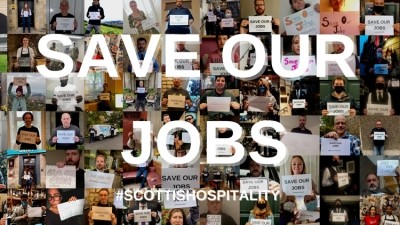Job Support Scheme slammed for not going far enough

Described last week by Chancellor Rishi Sunak as an 'expansion' of his Job Support Scheme (JSS) rather than an extension of the furlough or Job Retention Scheme (JRS), the new package will cover businesses that, as a result of restrictions set by one or more of the four governments in the UK, are legally required to close their premises.
This includes restaurants and hospitality businesses told to only operate on a collection or takeaway-only basis.
Under the scheme, the Government will pay two thirds of each employee's salary (or 67%) up to a maximum of £2,100 a month, with employers not required to contribute towards wages and only asked to cover National Insurance and pension contributions.
However, as Liverpool faces the prospect of its pubs and bars being shut down for four weeks, with other areas in the north expected to suffer similar restrictions, a rebellion by Conservative MPs and mayors in northern England have demanded the scheme be improved for workers of hospitality businesses forced to close, and have called for it to make up 80% or even 100% of staff wages.
As reported by the Financial Times, one Conservative MP, who represents a constituency in northern England, said: “The Government is shutting people’s businesses down and preventing people from working, so it probably should make up their entire pay.”
Another Tory with a northern seat said there was a 'substantial caucus' of MPs who “don’t like [Prime Minister Boris Johnson’s] approach to Covid”.
Jake Berry, a former Conservative minister, told the BBC the Government must 'stand behind people and businesses' hit by local lockdowns.
Speaking on Friday (9 October) following the Chancellor's announcement, Manchester-based chef Simon Wood, patron of the two-strong WOOD Restaurants group, told Sky News the package wasn't good enough.
"[The Chancellor] says this is an extension, I see it as a reduction," he said.
"66% of anyone’s salary, for me, isn’t good enough.
"Can my team, can my staff pay 66% of their bills? What about overheads, what about my suppliers?
"If we're forced to close, we've no support for leasing costs, supplier costs, National Insurance and pension contributions, where's it coming from with no revenue?
"We are hamstrung; that’s not a support package."
Starting from 1 November, the scheme will be made available for businesses in across all four UK nations for six months, with a review point in January.
In line with the rest of the JSS, payments to businesses will be made in arrears via a HMRC claims service that will be available from early December.
Additionally, the Government is also increasing the cash grants it is awarding businesses in England shut by local lockdowns.
These grants will be linked to rateable values, with up to £3,000 per month payable every two weeks, compared to the sum of up to £1,500 every three weeks that was available previously.
The devolved administrations in Scotland, Wales and Northern Ireland will benefit from a £1.3bn increase to their guaranteed funding for 2020-21 - allowing them to continue their response to Covid-19 including through similar measures if they wish.
Responding to the Chancellor's announcement, trade body UKHospitality welcomed the increase in grants for closed hospitality businesses, but repeated its calls for a much more comprehensive package of support for the whole sector to cover rent and other overheads to ease the strain on businesses.
"The need now is no less – possibly is even more – than the first lockdown, so a more comprehensive package of financial support is crucial," said Kate Nicholls, chief executive of UKHospitality.
"In addition to employment support that must include grants for businesses to cover losses on stock and other overheads, which are piling up.
"We have already seen some high-profile failures and the situation is becoming increasingly unsustainable.
"The financial support on offer must go further if tragic levels of closures and redundancies are to be averted.”

































